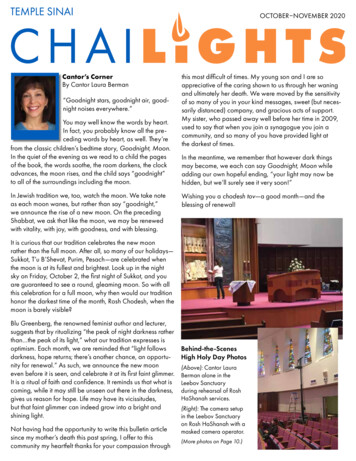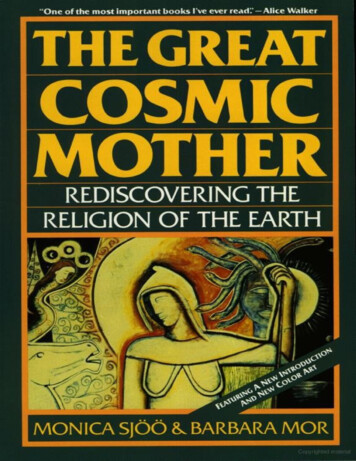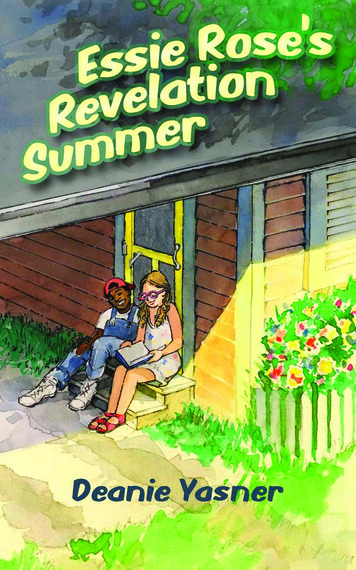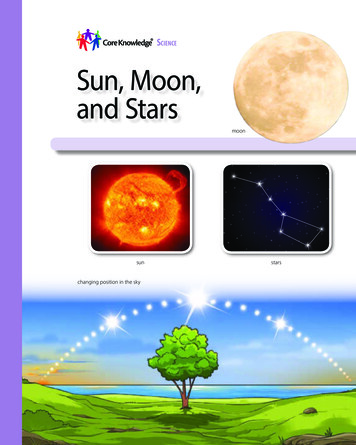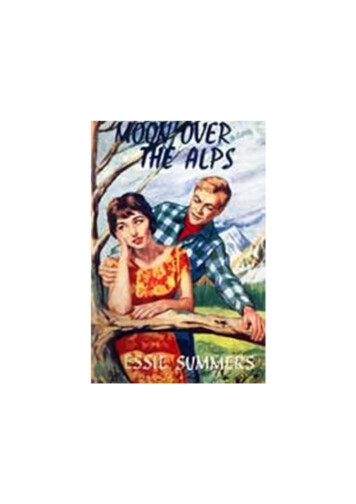
Transcription
From Back Cover "She's Penny Plain! But has rather good lines about her, don't youthink? And not too bad for holiday jaunting, lacking something moreglamorous?" Anger and humiliation and a desire to hit back washedover Penny as she heard Charles's words. She had believed thatCharles's friendship for her was something deeper than a mereholiday romance. There was only one thing to do Cinderella had runaway from the ball, hadn't she? Then so would Penny Smith, she toldherself.Taking a job on a remote back-country sheep station in the NewZealand Alps, Penny hoped that in the silence and vastness of themountains she would find healing and forget the memory of Charles.But unfortunately for Penny's plans, she chose the one place in theworld where this task would prove most difficult.
Moon Over The AlpsbyEssie Summers
CHAPTER ONEThis had certainly been the place to come to make a decision, Penny thought. Insurroundings like this it was so easy to sort out the things that mattered, andfalse values fell away in short, Dennis's values! You saw them for what theywere; cheap, shoddy, artificial.It was all over now. Her letter to Dennis had been written three days agowhen she had first, with a lightening of the load she had carried so long, takenoff her engagement ring and put it on the dressing-table of her room in thisguesthouse in the Queen Charlotte Sounds.That had been the first step towards returning it to Dennis by registered post,but she hadn't wrapped it up right away. That had been a pity as things turnedout. She had taken a knapsack with a picnic lunch and gone out to ramblethrough one of the bush tracks above the waters and returned to find the ringmissing.She had hated reporting it to the proprietor because it would makeunpleasantness and it was all her own fault. She hoped desperately there wouldbe no publicity about it—she could imagine how Dennis would fume!There hadn't been publicity, except locally, because that night the small sonof the proprietor, mightily scared, had confessed to his part in it.He'd wandered into Penny's room off the balcony and picked up the ring.Then he took it out on to the balcony to see how it would glitter in the sun,
putting it on the railing. Down swooped a magpie and, seizing the ring, flewaway with it.Complete consternation had followed the telling of this story, for there was awhole colony of magpies in the pines on the hill, but this bird might have a nestfar away.The next morning all the young fry of the guests had entered into the questmost wholeheartedly. Penny had watched them climbing, with her heart in hermouth. The magpies became most upset, scolding madly, flying in to attack occasionally, and when it was seen how much treasure-trove was in the nests itdidn't seem likely they'd ever find the ring. There were bits of tin, even brightlycoloured plastic pegs and horribly fouled Penny's ring.They had naturally taken her relief for sentimental attachment to it, and theproprietor had insisted on sending it to a Picton jeweller for cleaning andrestoring.It would come back this week-end, then Penny would know the break wasfinal.Already, sitting here with the sun of a New Zealand February beating downbetween her shoulder-blades and warming her heart, the heart that had been aheavy weight for so long, Penny felt gloriously free.Below and beyond the garden was spread the shimmering beauty of theSounds, countless bays and coves tucked fiord-like into the purple rangesbeneath a turquoise sky. The guest-house was the only building in the bay, builtright across the triangle of beach, and it dabbled its feet in the gentle waters,boats bobbing against the concrete sun-deck that ran the full length of WaiAhuareka. They had named it well Pleasant Waters.
Penny heard voices, looked over the hedge at the back of her seat andsighed. It was that objectionable Mrs. Orrman, and she was once morebuttonholing the new man who'd arrived two days ago. However, he lookedcapable of heading her off. A pity for his own sake he had chosen that solitaryseat to smoke a pipe. Mrs. Orrman seated herself beside him and continued withthe questionnaire she'd found so unrewarding yesterday.The voices, or rather voice, went on and on. Penny could have giggled at theadroit way he headed her off each time. Mrs. Orrman had let it be known shehad two charming daughters home in Wellington, and though she'd thought shewas being subtle it was plain to all that she hoped to make lasting friendshipswith the unattached male guests. They had all been most wary.Penny wondered how the daughters put up with mamma. Perhaps that wasthe reason they were not with her—couldn't stand accompanying a matchmaking parent.Poor Mrs. Orrman, she certainly was not making much headway thismorning, couldn't even be sure he was a single man. She left that topicmeanwhile and said, "Your tan isn't merely a holiday tan, I can see that!""Can you?" His voice held an ironic inflection."Oh, yes." She was impervious to irony. "One can see at a glance you're anoutdoor man. Perhaps a farmer? A station owner?"He smiled. "Oh, there are lots of other ways of acquiring a tan than that surveyors, miners, gold-miners, swaggers they're all tanned! Besides, in acountry like New Zealand, with plenty of sun, miles of beaches, and the gardencities, everyone seems tanned. Even the nine-to-five clerks get it at the weekends tilling their quarter-acres. Don't they say at Home you can always tell aColonial by his bronzed skin?"
"You—you mean you're from England originally? Yes of course yourvoice, so clipped, so pleasing!""I'm not from England." He was still smiling, and it was the first piece ofconcrete information she had got out of him.Warmed by this success, Mrs. Orrman moved in on him. "But you are a manof the land, I presume perhaps a pioneer family ?"He took his pipe from his mouth, looked at it, then directly at his inquisitor."Yes, I'm a man of the land. If you must know I'm on a large sheep station. Asa rouseabout! Rouseabouts get good wages these days, that's why I can afford tostay here. If you want any more details you could always look them up in Who'sWho New Zealand edition! Excuse me, won't you?" He rose, bowed slightly, andmoved uphill.He rounded the corner by Penny's retreat, and stopped dead as he saw her.She looked up, caught his furious eye and laughed."Ghastly, isn't she? But oh, how you handled her! Irony and evasion are nogood. It just slides off her back like water off a duck. Bluntness is the only thing.I'd been sitting here wondering if I had the nerve to come and rescue you."He laughed, anger sloughing off him like a skin, and his blue eyes twinkled.He sat down."What a woman! Her sort spoil these places."Penny nodded. "And it's a great disadvantage to be a lone male, I imagine.I've not suffered that but I've been pestered and pursued by endless partiesand entertainment committees. That's not my idea of a holiday at all. I wanteda solitary holiday; I love lying in the sun reading, or going for tramps through thebush. I hate crowds even when bathing, but just because I'm on my owneveryone's afraid I'm lonely or bored." Penny sounded indignant. "I've never been
bored in my life! So I'm pestered to go to barbecues and moonlight picnics and tojoin endless boating and launching parties."I admit I love boating, but the noise of the crowds spoils it for me, and I don'tknow enough to potter about by myself on the Sounds. But half these organisedaffairs are mostly twanging guitars and endless drinking and wisecracking."He nodded, his eyes on the waters below. "I feel that way myself, but I'mmore fortunate. I know all there is to be known about boats. How about joiningforces?"Penny was dismayed and showed it."Oh, I didn't mean to sound as if I was fishing for company. Oh, no, thank you.I couldn't do that. It would make me as—as importunate as Mrs. Orrman."He laughed easily. "Oh, the advantage wouldn't be all on your side don'tyou see?—You'd protect me from Mrs. Orrman and all her ilk. Once they seeme—er—attached to someone, they'll give up. I'm after a lazy, quiet holiday too,fishing and boating. How about it?"Penny said slowly, "It would be ideal if we could agree, each of us, to lookupon it solely as a holiday encounter not try to follow it up afterwards shipsthat pass in the night."He was quick to agree. "That would suit me. Is it a bargain?"Penny nodded."Then how about exchanging names? What's your Christian name?""Penny—Penelope.""Penny who?"She seemed to hesitate, then said, "Penny Smith."His mouth twitched. "How odd my name's Smith too. Charles Smith."
Their eyes met and locked, they laughed, and their laughter registered theabsurdity of it. They might just as well have said to each other, "Liar!" But it wasjust a bit of priceless holiday foolery and it sealed a bargain.It was certainly the way to enjoy the Sounds. Charles took over from theproprietor's eldest son, Duncan Swinton, the rather odd-looking craft he hadcontrived himself from an old car engine and some second-hand timber. Butwhatever the Koa Waka (Happy Canoe) lacked in beauty it made up for inperformance.Together Penny and Charles spent endless leisurely hours cruising round,visiting tiny uninhabited bays, each with its own delightful beach, exploring thetreasures of rock shore and bush, cooking meals out of doors, lying back on sun-baked sands, listening drowsily to the chorus of bird song and the lullingbackground of the ceaseless chattering of sun-happy cicadas.They experimented with the art of cooking Maori fashion, making fires in pits,with hot stones, soused with water where they laid their fish and kumeras, thesweet native potato, wrapped in leaves and then covered with sacks and left tosteam for hours while they bathed and fished.They were halcyon days, with a magical quality, and, for Penny at least, theymeant an interlude of utter peace before she returned to Christchurch and thestorm that undoubtedly would break over her head from her own family andDennis's when the broken engagement was made public.Her letter was most final, but would Dennis take it like a man? As meant?She doubted it. His pride would be hurt. It wouldn't go deeper than that. Hismother would be furious, his mother who had been at such pains to impressupon Penny how fortunate she was that Dennis, her Dennis, had looked her way.Had instilled into her the importance of the position she would occupy as his
wife how circumspect she must be, how she must conform always to theJessingford pattern, the Jessingford traditions.But Penny wasn't going to conform any longer either to Jessingfordtraditions or Smith traditions. The worm had turned.Her brother and sister-in-law would wonder, aloud probably, what had gotinto her. They would bring pressure of disapproval to bear upon her, to turn herback into—Penny Plain.She had always taken on the least congenial tasks of the family, thehumdrum responsibilities. She had meekly given up her teachers' training collegewhen her mother's health failed. They could so easily have got someone to helpin the house, but no, it had to be Penny. A daughter's clear duty, they had said.Then, when her mother's death had freed her, and she'd thought she couldresume her training, David, her brother, had taken on that big-salaried positionthat meant he was away from home for months at a time, and Iris, his wife, wastoo nervous to be left alone. There had been a baby coming, then another, andsomehow Penny had never got away and had taken an office position that hadnever satisfied her inner urge to teach, to continue learning.But David had appealed to her over-strong sense of duty "If you do go backto teaching," he'd said, "it will mean two or three years of country teaching, andIris would be on her own—her nerves would never stand it."Penny should have withstood all this insisted that Iris took a boarder but,of course, no boarder would have been willing to baby-sit so often, to listen toIris's constant complaints of overwork, to sit up with the children when they weresick, to do the mending, take over the washing and ironing when Iris was sick, ortired. But now—she was going to rebel .
Tonight, however, none of these thoughts bothered her she was wholly givenup to the charm of the present.Charles had said, earlier in the afternoon, "I know we've dodged the brightlights till now but you know that chap I was talking to in that little bay whileyou were frying our sausages yesterday? The one who was telling me all aboutfarming in the Sounds and rounding up sheep by launch and dogs? Well, he ranghere this morning and told me about an affair they're having tonight."He's across the other side of the Sound—at Korimaki Inlet. Owns two or threebays. One bay has half a dozen cottages in it and he lets them to holidaymakers. He's putting on a barn dance for them tonight and wondered if we'dlike to go.""Oh, Charles, I'd love to. This crowd here is so artificial I've not gone to any ofthe dances, but I love to dance really, and I've never been to a barn dance.""Haven't you, Penny? They're the best dances there are. Are you a city girl?"She nodded. They had been careful not to probe into each other's lives, thiswas the first question touching their workaday world."City born and bred, but always longing to live in the country. Father came ofgenerations of farming folk in Wales. But Mother hated it."So they had gone at twilight across the purple Sounds to where presently theysaw coloured lights threaded through the semi-tropical gardens of KorimakoInlet, lighting up heathery manuka and nikau palms with rainbow stars.The barn had been decorated with native bush, tree-ferns, mosses andgreenery redolent of the scented bush; there were cabbage tree tufts springingout of mossy logs, tall, silvery plumes of toi-toi on the corners, tiny potted ferns,feathery creepers, and splashed between them the glowing, flamboyant coloursof bougainvillea and canna lilies.
Penny caught sight of herself in a large mirror set in a grotto of greenery andrealised she wasn't Penny Plain tonight but Cinderella at the Ball. Like most ofthe holiday-makers, she wore a full peasant skirt, braided in black, and hers wassplashed with vivid poppies and marigolds. Her white muslin blouse was scoopedlow and embroidered in all colours and about her slim waist was folded a stiffblack taffeta cummerbund.Here was none of the formality that would have bored Penny at otherdances. There were square dances and Scottish folk dances, reels and waltzes.As they came together in a movement Charles said, catching her hands, "Doyou know they always do the Lancers here to finish up with? Can you do theLancers?"Her amber-brown eyes widened. "No, I have only the faintest idea but whatfun! If you can, I'll try to follow you."He laughed. "It's about the only dance I'm expert in. My grandmother taughtme. She tried to teach me the mazurka and the minuet too, but gave up."Penny laughed, trying to imagine Charles's broad, craggy bulk going througha minuet."Sounds like another century, doesn't it?""When you meet my grandmother," he said, "you'll realise she does belong toanother century."When you meet my grandmother. Penny kept her colour down, but knew awarmth at her heart so it wasn't to be just a holiday romance after all.Penny had a dance with a handsome Maori lad who was studyingengineering at Canterbury University, and she saw Charles go by with a Maorigirl whose shoulder-length black hair was circled with a chaplet of berries. Shedidn't know when she had enjoyed anything more.
"Come out for a breather," said Charles a little later. They wandered out intothe scented night. It was so warm Penny needed nothing more than a filmyblack woollen stole spangled with sequins to drape about her shoulders.There was a stile under some matai trees, and Charles swept it with hishandkerchief, put his hands about Penny's waist and lifted her on to it."You're too light, Penny," he complained. "Haven't been dieting, have you?"She shook her acorn-smooth brown head. "No, but I've lost weight lately. I'llsoon put it on again.""Why will you?""I was fretting over something—but not now, and don't ask me about it,please, Charles. It doesn't belong to tonight. Doesn't belong to my holiday."He let it go. He stood beside her, smoking. In the light of the Sounds moonthey could see each other distinctly. He tossed away his cigarette, ground itcarefully into the turf, said, "This is a good way of getting to know each other,Penny. No strings attached at first, no backgrounds to judge each other by. Butwe've got down to the elemental things, I think we agreed to take each otheron just for holiday-time, but—"At that moment the sound of beautifully harmonised voices came across tothem.Penny stood up, caught at Charles's shoulder. "Oh, Charles, the Maoris aresinging. We mustn't miss it. They're doing it in Maori costume. Let's go in."He laughed indulgently. "Don't want to miss a thing, do you? Very well—it willkeep."It was two in the morning when Penny and Charles set out for the guesthouse, the sound of music still accompanying them across the starlit waters.
Penny was afraid to let a silence fall. Not that she didn't want to hear whatCharles had to say, indeed, she wanted it with everything in her, but there was acertain code.When—if—Charles told her what she hoped to hear, she wanted to be able tosay, honestly, that her engagement was broken. She couldn't really feel it was tillDennis's ring was on its way to Christchurch. The Picton jeweller had promised tohave it back by tomorrow. Till then she must head Charles off.He moored the boat, gave her his hand to help her ashore. Here a spreadingngaio tree, gnarled and dense, curved out from the hillside and overhung agarden seat. He swung Penny on to it in one sure movement, his arms about her,strong, compelling, his face close to her."Fancy finding you on a holiday I didn't particularly want to take!"He laughed, bent his head, and suddenly his lips were on hers, seeking,finding, mastering.In that moment Penny knew exactly why she'd broken off her engagement toDennis. There had never been anything like that with him, no sense of the starssuddenly whirling in their orbits, of the night being made for this, for this alone.For the feeling of utter rightness, utter oneness, of having come home at last towhat every woman at heart wanted, the haven of a man's arms. Arms thatmeant magic.The next moment she panicked. It wasn't right to yield to this—not whileDennis's ring and letter remained unposted.As Charles's arms slackened and he looked down on her, a question in his blueeyes, a smile lifting the corner of his square-cut mouth, she sprang to her feet, herhands against the lapels of his jacket in a restraining gesture.
"No, Charles," she said breathlessly, "no more not yet it's too soon. I—let's goin."His smile was whimsical, tender, amused, understanding. It did all sorts ofthings to Penny's heart."All right, sweetheart, we've all tomorrow and the next day and the next—it'sreally tomorrow now three a.m. Am I rushing you? No early bathe tomorrow,and you'd better have breakfast in bed. I'll take you up now."Despite the lateness of the hour it was another hour before Penny slept. Howright she had been to write that letter to Dennis. Fragments of it kept coming tothe surface of her mind."You've never really loved me, Dennis—not as a woman wants to beloved. Our feelings have been so tepid. If you'd loved me you wouldn'thave wanted to make me over you and your mother."I've got to the stage where I'm not natural any more. I repress everyspontaneous feeling because you like me to be so circumspect, to conformto your idea of what the future Mrs. Jessingford should be. And you don'tlike my friends, and you detest my habit of picking up lame dogs I'vealways lived other folk's lives Mother's, David's, Iris's, yours. But now I'vehad it. I'm getting out before it's too late. And I'm going to get a job I likedoing."Please don't try to make me alter my mind it's irrevocably made up.Marriage—to me at least—must be all or nothing. I'm sure you'll be muchhappier with someone else, someone not a wicked rebel like- Penny."
Penny turned on her pillow. How had she ever promised to marry him in thefirst place? Was it because you got tired of looking for your ideal? Of feeling thatan ideal just didn't exist, that the world didn't hold him?It was wrong. Second-bests never served. The world did hold the ideal Charles! Charles, who never said impatiently, "Must you do that, Penny?" or "Youought to put your hat on—your nose will blister," or "Must you always getinvolved with odd people, Penny?"She giggled to herself, remembering how cross Dennis had been that day atWellington Zoo when she had spoken to that old elephant trainer from Englandand he'd tagged on to them all afternoon.With Charles she had been windblown, sunburnt, covered with fish scales, hotand tired, but with him she somehow always felt beloved and lovely. She'd neverbe Penny Plain in his eyes Charles, whose mind matched hers, who loved thesame books, the same entertainments, the same jokes .Odd, wasn't it, they knew nothing about each other at all backgrounds,occupations, where they lived. Come to that, she didn't even know his real name.Smith, indeed! But all these things would be revealed in the next few days because tomorrow—at least today, for it couldn't be far off the summer dawn—they would tell each other all they needed to know.She would tell Charles about Dennis tomorrow, and coming up here to thinkthings out Charles, dear Charles Penny at last fell asleep, a smile on her lips.After her breakfast in bed, brought up by the smiling Maori girl, Erihapeti, Pennydressed herself in an embroidered linen sun-suit, a tiny bolero over the sun-top,and tied her hair back with a yellow ribbon.
From her window she had seen the mail-boat come in. Good, she would godown to get her ring, and pack it for posting, and she could meet Charles with aclear conscience. When they were away by themselves she would tell him aboutit, quietly and not dramatically, or as if she expected it might affect theirgrowing relationship. Tell him that she had come here for a specific purpose—that of thinking out if she really did want to spend the rest of her life with Dennis!And had decided she did not.As Penny went along the stone terrace on her way to the office, her lightbasketwork sandals making no sound, she noticed Charles leaning over therailing looking at the flotilla of little boats bobbing on a full, shimmering tide.Penny was glad he did not look around. When she met Charles again shewanted it to be with the knowledge that the break with Dennis was indeedaccomplished.Charles's companion made some idle remark she did not catch. Then cameCharles's voice, deep but carrying. It held amusement."Oh, yes, I agree. Very, very homely. In fact—Penny Plain! But rather goodlines about her, don't you think? And not too bad for holiday jaunting, lackingsomething more glamorous!"Penny stood stock still for one shocked moment, the blood rushing to her face,pounding in her ears, then her face paled, leaving her lipstick standing out like ascarlet gash.Unheard she had come, unheard she went, turning in at the open frenchwindows and taking the main staircase. She shut the door of her room and stoodagainst it, breathing as hard as if she had been running fast. What a fool she hadbeen! Reading into Charles's unspoken words of last night a permanentmeaning if he had sounded serious and loving it was only the effect of
moonlight on the Sounds hadn't she once before experienced the unreliablebewitchery of moonlight? Hadn't there been a moon over Scarborough Headthe night at Sumner when Dennis had proposed?Then why—oh, why—hadn't she recognised it for false enchantment ? thestuff dreams are made of gossamer and stardust not a fit fabric for the wearand tear of everyday life.Didn't women deceive themselves! She had thought herself lovely anddesirable in Charles's eyes last night and this morning, to a stranger, he hadcalled her—homely!Then he had damned her with faint praise: her lines weren't too bad—no, shesupposed her figure couldn't be faulted, but otherwise she was well, whatwould Charles think her?—Mousey, nondescript, she supposed! Not dashing,colourful. In fact, exactly what he had said—not glamorous, but all right as aholiday companion!Anger and humiliation and a desire to hit back washed over Penny likesucceeding waves, then receded, leaving her feeling spent.This was worse than anything Dennis had done to her. His had been onlysmall humiliations compared with this. Dennis she despised, but she could forgivehim. He didn't matter. Charles she hated. She couldn't forgive him. He didmatter. Suddenly Penny knew she could not bear to face another meeting withCharles.There was only one thing to do Cinderella had run from the ball, hadn't she?Then so would Penny Smith. But no glass slippers to leave behind, no clues. Shewould tell Mr. Swinton not to give her address to anyone. Penny stopped short inher thinking—how stupid could one get?—Charles wouldn't ask for her address.
He wasn't interested in her except as a companion for his solitary holiday, someone to protect him from the husband-hunters. Penny's face burned.There were certain mornings when the mail-boat put back again in aboutthree-quarters of an hour. You could post mail then, and they would takepassengers if they were content to continue with the mail-delivering around theSounds for a few hours before going back to Picton. But what would thatmatter? The main thing was to get away, not to have to meet Charles again.She hoped he would feel slightly chagrined when he heard that she too haddecided there must be no follow-up.She would go down now she had recovered from the first shock of Charles'sdisparaging words, to see if her ring was there, and to make sure the mail-boatwas putting back today. She'd go down the main staircase, not the outside one,and hope Charles was still on the terrace.As she got to the foot of the stairs the doors from the terrace swung open andCharles came through—broad, fair, with that attractive, dependable air thatwas so deceiving.He smiled, came to her, "Oh, there you are, Penny. How about going—"Penny had stopped dead because she didn't know quite what to say, butCharles had broken off his speech because Mr. Swinton, with Henare the mailboat man behind him, had arrived at the foot of the stairs at the same time.Henare had the registered mail-book open and on top of it was a smallpackage heavily scored across with blue pencil. Penny gazed at it in strickenfashion.Mr. Swinton said heartily, "Excuse me, but here it is at last—your engagementring, safe and sound. Henry wants you to sign for it registered mail, you know."
Penny didn't look at Charles, though she was immediately aware he hadstiffened.She said, automatically, "Oh, thank you, Henare where do I sign here?" Shetook the ink pencil he proffered, and signed, picking up the package.The two men went back into the office leaving a tangible silence behindthem. Penny and Charles looked at each other, measuringly.Penny was conscious of a queer feeling, one she had never beforeexperienced—she was glad, terribly, horribly glad at someone else's discomfiture.It served him right!Yet how odd he looked quite pale. Perhaps because his vanity would behurt. Men were quite unpredictable, and, despite the fact that they pridedthemselves on their logic, unreasonable. Apparently it was quite all right forthem to just amuse themselves, but not for the women to do it at their expense.Oh, the lordly male!"Well?" asked Charles, his eyes cold and grey, his voice hard.Penny deliberately stripped off the paper, flicked open the ring case, slippedthe ring on her finger.She said, in a carefully relieved tone, "It's just as good as new."Charles said, his tone just as carefully controlled, "I'm not interested in thecondition of the ring. Why didn't you tell me you were engaged?"Penny was amazed at her own coolness. She looked up, wide-eyed andinnocent."But we avoided being curious about each other we agreed it was merely aholiday interlude."
There were other people descending the stairs; someone was coming into thelounge.Charles said in a dry tone, "So we did but it doesn't stop me from thinkingyou're a rotten little cheat, Miss Smith, Miss Smith, indeed!" He turned on his heel,walked out to the terrace. Through the glass doors Penny could see him descendthe steps to the narrow shingly beach, step on to the Happy Canoe, start theengine and shoot across the sparkling water. Penny moved blindly off the stairs,walked on to the terrace; suddenly the clear-cut scene blurred before her eyes.She wasn't aware of the chatter on the beach, the happy sound of cicadas, thebell-birds and tuis in the bush all she could hear was the sound of the engine ofthe Happy Canoe as it took Charles out of her life into the immensity of theSounds.Penny looked vaguely down at the ring-case, drew off the ring, placed it inthe case, dragged the torn paper about it. She looked at her watch, turned tosee Erihapeti behind her."Oh, Betty," she said (most of the guests used the English diminutive of theMaori name for Elizabeth), "is it this morning the mail-boat comes back? I've gotto go home."Erihapeti looked surprised. "Yes, it is—but you won't have much time could Ihelp you pack? I hope it's not bad news."There was a tiny frown between the Maori girl's beautiful brows. She'dpacked a picnic hamper for Mr Charles Beaudonais-Smith. He'd intended it forhimself and Penny, she was sure but he'd gone out in the Happy Canoe andleft it and Penny behind.She hoped it didn't mean they had quarrelled. She liked Mr. BeaudonaisSmith—always friendly, never familiar. He and Miss Smith seemed most
attracted, what an ideal couple they would h
Essie Summers . CHAPTER ONE This had certainly been the place to come to make a decision, Penny thought. In surroundings like this it was so easy to sort out the things that mattered, and false values fell away in short, Dennis's values! You saw them for what they




